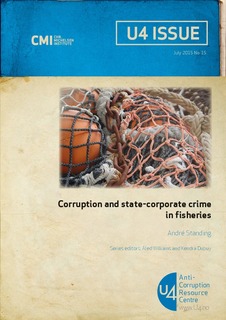| dc.contributor.author | Standing, André | |
| dc.date.accessioned | 2018-01-04T08:19:57Z | |
| dc.date.available | 2018-01-04T08:19:57Z | |
| dc.date.issued | 2015-01-01 | |
| dc.identifier | oai:www.cmi.no:5589 | |
| dc.identifier.citation | Bergen: Chr. Michelsen Institute (U4 Issue 2015:15) 25 p. | |
| dc.identifier.uri | http://hdl.handle.net/11250/2475054 | |
| dc.description.abstract | This U4 Issue paper describes corruption in the fisheries sector through the lens of state-corporate crime. It presents a case study from Senegal where Russian, European and Asian fishing firms, supported by their home governments, gained access to overfished stocks that are vital to local food security and the artisanal fishing sector. The discussion draws on further evidence from other countries and elaborates on the main observations from Senegal about the nature and implications of state-corporate crime in fisheries, including the role of corruption. The paper considers the policy implications for the international fight against corruption and illegal fishing, and argues that existing approaches based on law enforcement is insufficient. International efforts to address fisheries crime will require political reforms, including advancing democratic governance and human rights. | |
| dc.language.iso | eng | |
| dc.publisher | Chr. Michelsen Institute | |
| dc.relation | U4 Issue | |
| dc.relation | 2015:15 | |
| dc.relation.ispartof | U4 Issue | |
| dc.relation.ispartofseries | U4 Issue 2015:15 | |
| dc.relation.uri | https://www.cmi.no/publications/5589-corruption-and-state-corporate-crime-in-fisheries | |
| dc.subject | Natural Resource Management | |
| dc.title | Corruption and state-corporate crime in fisheries | |
| dc.type | Research report | |
